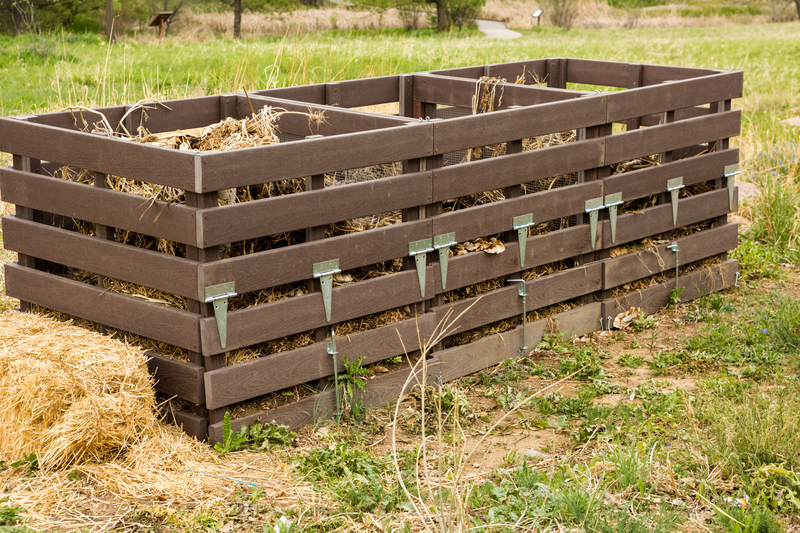Discover How to Deal with Bulky Waste Items on a Budget
Managing bulky waste can often seem like a daunting and expensive task for homeowners, tenants, and businesses. Unwanted furniture, large appliances, or heaps of garden debris not only eat up valuable space but can also cost a fortune if not handled wisely. However, with the right tips and budget-friendly strategies, you can easily learn how to dispose of large items without draining your wallet. This comprehensive guide explores cost-effective ways to handle, recycle, repurpose, and remove bulk waste items, making your environment cleaner and greener.
What Are Bulky Waste Items?
Before tackling disposal strategies, it's important to define what counts as bulky or oversized waste. These are items too large for regular trash collection, including:
- Old furniture (couches, beds, wardrobes, etc.)
- Large appliances (fridges, washing machines, stoves)
- Mattresses and box springs
- Outdoor equipment (lawnmowers, BBQs, bikes)
- Electronic items (TVs, computers, printers)
- Garden waste (tree limbs, branches, old sheds)
Knowing what counts as bulky refuse ensures you follow the right process and avoid unnecessary fees or penalties.

Why Proper Management of Bulky Waste Is Important
Ignoring or improperly disposing of oversized waste can lead to environmental issues, cluttered spaces, and local fines. Responsible handling of these items offers several benefits:
- Environmental Protection: Prevents items from ending up in landfills unnecessarily.
- Community Cleanliness: Keeps neighborhoods tidy and hazards at bay.
- Resource Recovery: Items like metal or electronics can be recycled, conserving raw materials.
- Cost Saving: Avoid fines by using designated disposal or recycling methods.
Best Budget-Friendly Strategies for Bulky Waste Removal
1. Check Your Local Council or Municipality Services
Many cities and towns offer free bulky waste collection days or affordable curbside pick-up programs. Here's how to take advantage:
- Research local collection schedules - these are often listed on your city website.
- Register or book a slot: Some services require online or phone booking.
- Follow guidelines: Only set out items that are accepted, to avoid surcharges.
Relying on municipal programs is one of the most cost-effective solutions for large waste disposal.
2. Donate Usable Items
If your bulky items are still in good condition, consider donating instead of disposing. Many charities accept furniture, appliances, and other household goods. Benefits of this method include:
- Free pick-up options from certain organizations, saving you transportation costs.
- Tax deductions for charitable contributions (check with your local tax authority).
- Helping those in need and keeping items out of landfill.
Contact local branches of organizations like the Salvation Army, Habitat for Humanity, shelters, or second-hand shops for their donation policies on oversized items.
3. Sell or Give Away Online
The online marketplace isn't just for making a quick buck. It's also a practical way to get rid of large unwanted goods while staying on budget. Here's how:
- List items on platforms such as Facebook Marketplace, Craigslist, Gumtree, Freecycle, or Nextdoor.
- Include clear pictures, accurate descriptions, and terms like "free for pickup" to attract local takers.
- Arrange curbside or driveway pickups to minimize physical contact and effort.
Even if you're not looking to make money, offering free bulky items removal is often enough to draw local residents who need what you no longer do.
4. Repurpose and Upcycle
With a little imagination, some bulk waste items can be transformed into something new, saving money on both disposal and new purchases. Ideas include:
- Turning an old dresser into a TV stand or workspace.
- Using pallets or wooden furniture parts for DIY shelving or garden planters.
- Refurbishing a discarded bike for children or donation.
This eco-friendly, budget-savvy approach not only reduces trips to the landfill but also fosters creativity.
5. DIY Transport to Waste Facilities
If local pick-up options are limited, or your items aren't suitable for donation, consider hauling the waste yourself. Tips for minimizing costs:
- Check your local recycling center's rates - many offer discounted fees for residents.
- Sort items by material (metal, wood, electronics) as many facilities have free drop-off for recyclables.
- Borrow or rent a truck with family or neighbors to share costs.
- Avoid landfill drop-offs--recycling facilities are generally cheaper and sometimes free for select items.
6. Pool Resources with Neighbors
Disposing of large items as a group can keep costs down. Here's how to handle bulky domestic waste collaboratively:
- Coordinate with neighbors for a shared skip hire or dumpster rental.
- Split transportation fees if driving to the landfill or recycling facility.
- Organize a neighborhood clean-up day and negotiate bulk discounts with local haulers.
Pooling resources means you can benefit from volume-based discounts and foster community spirit at the same time.
7. Use Professional Bulk Waste Removal Services (Strategically)
Hiring a junk removal company isn't always as costly as you'd think, especially if you:
- Shop around for quotes - compare at least three companies.
- Book during off-peak times for potential discounts.
- Opt for load-share options where possible.
- Ask about eco-friendly disposal and recycling guarantees.
Professional services are ideal when speed, convenience, or safety is a concern. Ask for a clear price breakdown to avoid hidden fees.
How to Prepare Bulky Items for Disposal
Regardless of the disposal method you choose, preparing your items makes removal easier, safer, and possibly cheaper:
- Disassemble furniture when possible to make lifting and transport easier.
- Remove doors from fridges, ovens, and cabinets for safety.
- Drain any fluids from appliances like lawnmowers in accordance with local environmental guidelines.
- Bundle or tie long or awkward items together.
- Label electronics for e-waste recycling if required.
Common Mistakes to Avoid When Disposing of Bulky Waste on a Budget
Don't let these avoidable missteps hike up your costs:
- Illegal dumping: Dumping on public land or unauthorized areas can lead to heavy fines and environmental harm.
- Ignoring recycling options: Many items can be recycled or repurposed - check before trashing!
- Not comparing disposal services or facilities - shop around for the best value.
- Overlooking donation or selling opportunities.
- Forgetting to prep items, which could lead to extra labor charges from haulers.
Bulky Waste Removal for Businesses - Keeping Costs Low
Commercial property owners and businesses can also save big on large waste disposal with smart practices:
- Set up a regular removal schedule to avoid emergency fees.
- Invest in back-of-house storage or compaction solutions for ongoing generation of large waste.
- Negotiate bulk contracts with local haulers for better rates.
- Train staff on separating recyclables and hazardous items for separate collection.
- Participate in local take-back programs for e-waste or office equipment.
Reducing bulk waste in the first place (by choosing multi-use or modular office furniture, for example) will also help keep disposal expenses minimal.
How to Find Local Bulky Waste Removal and Recycling Centers
Finding convenient, budget-friendly options is easier than you think. Here's what to do:
- Search city websites for official programs or local maps.
- Use mapping apps (Google Maps, Apple Maps) with terms like "bulky waste disposal near me" or "large item recycling."
- Check community bulletin boards and local news for collection event announcements.
- Ask hardware, furniture, or appliance stores about take-back programs.
How Bulky Waste Is Recycled and Repurposed
Many big items contain valuable or hazardous materials and should never be sent to the general landfill. Here's what happens when common bulk waste is recycled:
- Metals: Extracted and melted down for reuse.
- Wood: Turned into mulch, chipboard, or biofuel.
- Appliances: Components stripped for parts, motor recycling, refrigerants safely disposed.
- Mattresses: Fabrics, steel springs, and foam separated and recycled.
- Electronics: Shredded to extract precious metals and plastics.
By choosing recycling and appropriate disposal, you help conserve resources and protect your community.
Frequently Asked Questions About Bulky Waste Disposal on a Budget
Are there free bulky waste collection options?
Yes, many municipalities offer periodic free curbside pickups or drop-off events. Check with your local council or public works department.
How can I make money from large unwanted items?
Try selling working appliances, furniture, or electronics online. You can also offer items for free--saving you disposal costs while helping others.
Is it illegal to leave furniture on the curb?
Unless scheduled for authorized pick-up, it can be considered illegal dumping and subject to fines. Always follow local guidelines.
Are private junk removal companies worth it?
For convenience and speed, especially with hazardous or extremely heavy items, yes--just get several quotes and clarify their recycling policies to ensure the best value and eco-friendly disposal.
What if I have a mix of different bulky waste types?
Sort items by material, as some may be eligible for free recycling (like electronics or metal), while others require a disposal fee. Check facility rules in advance.

Key Takeaways: Dealing with Bulky Waste on a Budget
- Research local and free removal options first to save money and avoid fines.
- Donate or sell items in good condition to reduce waste and help others.
- Repurpose or upcycle where possible--it's eco-friendly and budget-wise.
- Recycle and separate materials to keep costs low and follow regulations.
- Team up with neighbors or businesses for bulk savings.
- Always prep large items for easier, cheaper removal.
Conclusion
Disposing of bulky waste items on a budget doesn't have to be stressful or expensive. With proactive planning and a little creativity, you can responsibly remove, recycle, or repurpose large items while saving money and supporting your community. Whether you're clearing out a garage, downsizing your office, or just handling seasonal yard waste, following these tips will help you achieve a clutter-free, eco-friendly space at minimal cost.
If you're looking to learn more about affordable bulk waste disposal or specific programs in your area, start by visiting your city or waste collection websites today. Turn your trash problem into a green solution--without breaking the bank!
